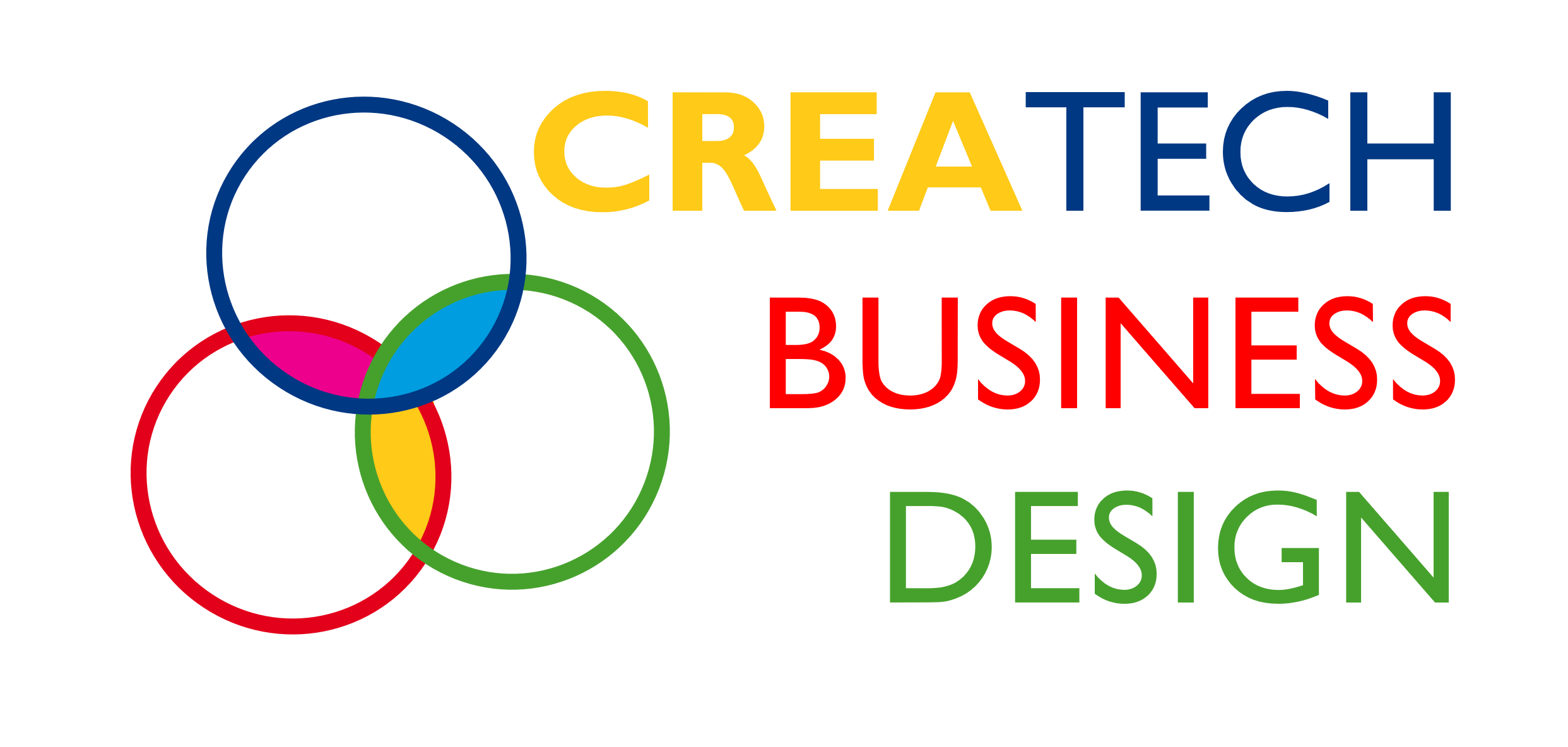MOodVIES
ImaginaLIST
Best Movies Watched in 2024 and Top 2020s Predictions by Genre
A Genre-by-Genre Breakdown of the Best Recent Films and Bold Predictions for the Defining Movies of the 2020s
As we step into 2025, the film community is abuzz with critics and vloggers sharing their favorite movies of 2024. From heated debates about Golden Globe winners to predictions for the upcoming Oscars and Critics Choice Awards, it’s the perfect time to reflect on the cinematic year that was. I couldn’t resist compiling my own list of the top 15 movies I watched in 2024, although I still have a few releases to catch up on.
To achieve this, I’ve set an ambitious framework: approximately 15 standout films per year, inspired by the 10 Best Picture plus 5 International Film Oscar contenders each year, revisited alongside uncut gems and world movies. Beyond the traditional Golden Globe categories of ‘Drama’ and ‘Comedy or Musical,’ I’ll delve deeper into genres like History & War, Thrillers & Crime, and Sci-Fi & Fantasy to craft my selection.
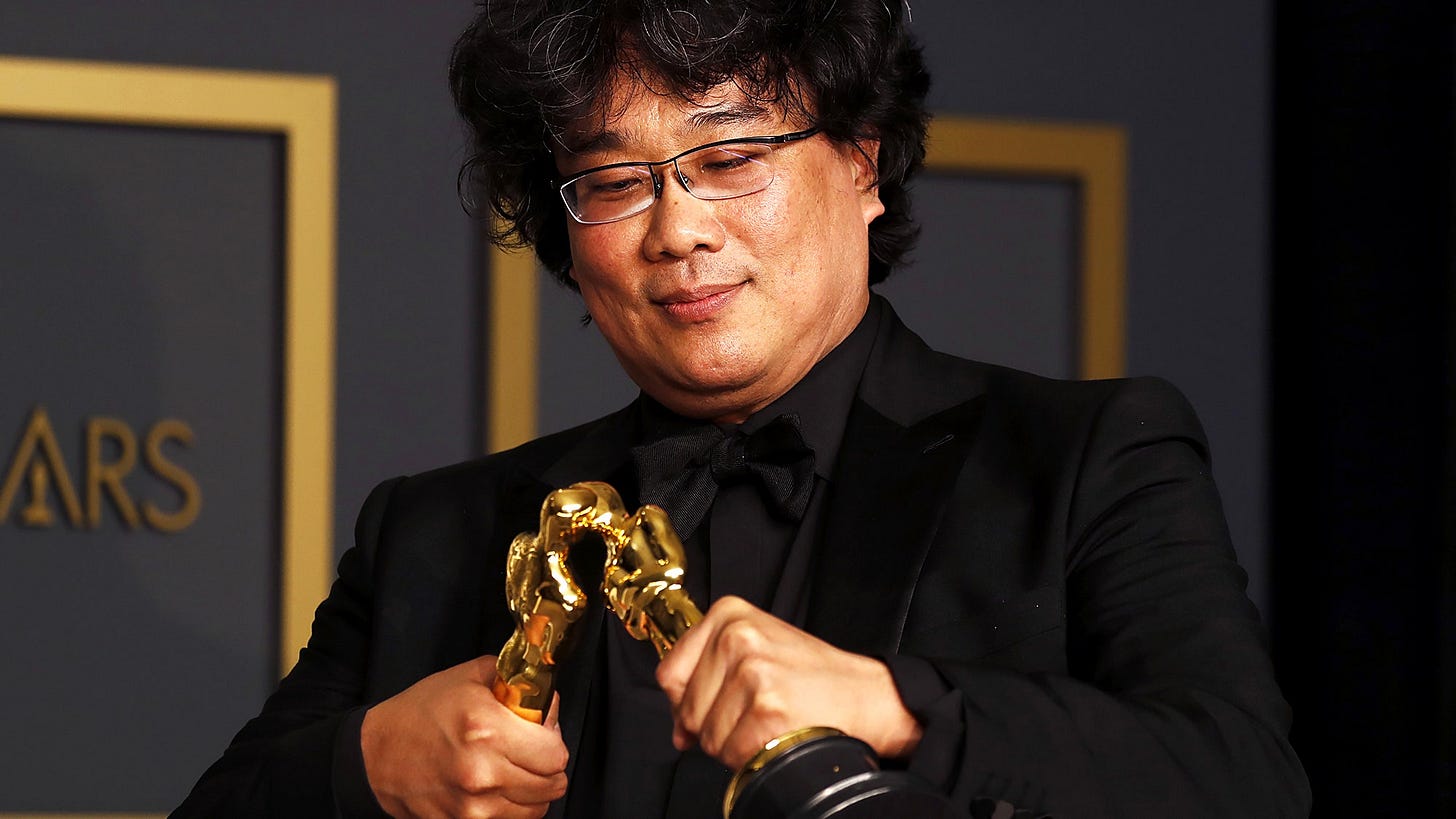
2025 marks the halfway point of the decade, making it the perfect time to reflect on the best films of the 2020s so far. My goal is to curate a definitive list of the top 100 movies of the decade—similar to Letterboxd’s “Decadent Best of the 2010s” lists. By revisiting the best pictures, international gems, and overlooked masterpieces, I aim to highlight the defining films of our era by genre and offer some predictions.
In this article, I’ll begin by revisiting films from 2020 to 2023, including many Oscar nominees and overlooked treasures I believe deserved more recognition. I’ll then share my top 10 movies watched in 2024, along with 5 more films that might earn a spot in the ultimate top 100 of the decade. Finally, I’ll look ahead with predictions for highly anticipated releases and dream projects that could define the second half of the 2020s.
Check out my in-progress Letterboxd list Top Movies of the 2020s featuring more films I’ve watched and upcoming releases before finalising the Top 100.
Drame / Romance
Oscar Best Pictures and International Films (nominations):
– Released in 2020: Nomadland (Winner of Best Picture), Minari
– Released in 2021: Drive My Car (Winner of Best International Film)
– Released in 2022: The Fabelmans, Tár
– Released in 2023: Past Lives, Perfect Days
Uncut Gems and other foreign films: Aftersun (2022), Happening (2021)

Top 2+1 watched in 2024: Perfect Days & How To Make Millions Before Grandma Dies + Challengers
To catchup and watchlist for 2025: All of Us Strangers, HERE
Most anticipated upcoming film or in project: Kogonada’s A big bold beautiful journey
Comedy / Drama / Romance
Oscar Best Pictures and International Films (nominations):
– Released in 2020: Another Round (Winner of Best International Film)
– Released in 2021: The Worst Person in the World
– Released in 2022: Triangle of Sadness, Everything Everywhere All at Once (Winner of Best Picture), The Banshees of Inisherin
– Released in 2023: Holdovers
Uncut Gems: Babylon (2022), It’s me Margaret (2023)

Top 2+1 watched in 2024: Holdovers & Anora + Didi
To catchup and watchlist for 2025: Kneecap
Most anticipated upcoming film or in project: Untitled Daniels Project (2026), Untitled Chazelle Project
Thriller / Crime / Mystery
Oscar Best Pictures and International Films (nominations):
– Released in 2023: Anatomy of a Fall
Uncut Gems and other foreign films: The Beasts (2022), Decision to Leave (2022), All Your Faces (2023), Red Rooms (2023)

Top watched in 2024: Sing Sing & Monster + Beating Hearts
To catchup and watchlist for 2025: Conclave, The Seed of the Sacred Fig, Emilia Perez (all nominated for the Oscar 2025 Best Picture or International Film), The Amateur
Most anticipated upcoming film or in project: Anderson’s The Battle of Baktan Cross (2025), Untitled Peele Film (2026)
Science (& Tech) Fiction / Fantasy / Horror
Oscar best pictures and international films (nominations):
– Released in 2021: Dune: Part One
– Released in 2022: Top Gun
– Released in 2023: Oppenheimer (Winner of Best Picture), Barbie, Poor Things
Uncut Gem: Tenet (2020), Godzilla Minus One (2023)

Top watched in 2024: Dune: Part Two & Poor Things + The Substance
To catchup and watchlist for 2025: Wicked, Nosferatu, Mickey 17, 28 Years Later
Most anticipated upcoming film or in project: Del Toro’s Frankenstein (2025), Cameron’s Avatar III (2025), Nolan’s The Odyssee (2026), Gerwig’s Narnia (2026), Villeneuve’s Rendez-Vous with Rama
History / War / Period Drama
Oscar Best Pictures and International Films (nominations):
– Released in 2022: All Quiet on the Western Front (Winner of both Best Picture and International Film)
– Released in 2023: Killer of the Flower Moon, Zone of Interest (Winner of Best International Film), Taste of Things
Uncut Gems and other foreign films: Lost Illusion (2021)

Top 2+1 watched in 2024: Zone of Interest & The Count of Monte Cristo + Taste of Things
Watchlist for 2025: The Brutalist, I’m Still Here, Nickel Boys (all nominated for the Oscar 2025 Best Picture)
Most anticipated upcoming films or in project: Nuremberg (2025/2026), Villeneuve’s Cleopatra / James Cameron’s Last Train from Hiroshima
I predict that this decade will bring a new entry into the Top 10 Lifetime Adjusted Gross, likely in the form of a historical romance drama—similar to Gone with the Wind (1939), Doctor Zhivago (1965), and Titanic (1997).
Let’s assume James Cameron won’t achieve this again with Last Train from Hiroshima, as the book it’s based on suggests it is unlikely to feature a romantic storyline. The film will recount the true stories of individuals who miraculously survived the atomic bombing of Hiroshima, only to endure the second bombing in Nagasaki after traveling between the two cities by train.
My top contender to direct a historical romance drama of this scale is Christopher Nolan. If such a film were to materialise, it could serve as the final instalment of an unofficial trilogy—following Dunkirk (2017), which centred on one of World War II’s most famous battles, and Oppenheimer (2023), which I have considered previously as a blend of Tech Fiction together with the Sci-Fi genre.
Critics of Oppenheimer who lamented the absence of graphic depictions of the atomic bomb’s devastation may be surprised to see a more emotionally charged, romantic exploration of the war between the West and Asia. A film set in Japan and/or China, capturing both the human cost and an epic love story, could resonate deeply with global audiences—potentially securing its place among the Top 10 Lifetime Adjusted Grosses.
Scorsese and Fincher: Thriller/Crime Directors and Masterminds of Suspense
Gone Girl (2014) | Rating: 83%
Directed by: David Fincher | Based on: Gillian Flynn’s crime thriller novel
The Girl With the Dragon Tattoo (2011) | Rating: 79% | 1 Oscar Winner
Directed by: David Fincher | Based on: Stieg Larsson’s psycho thriller novel
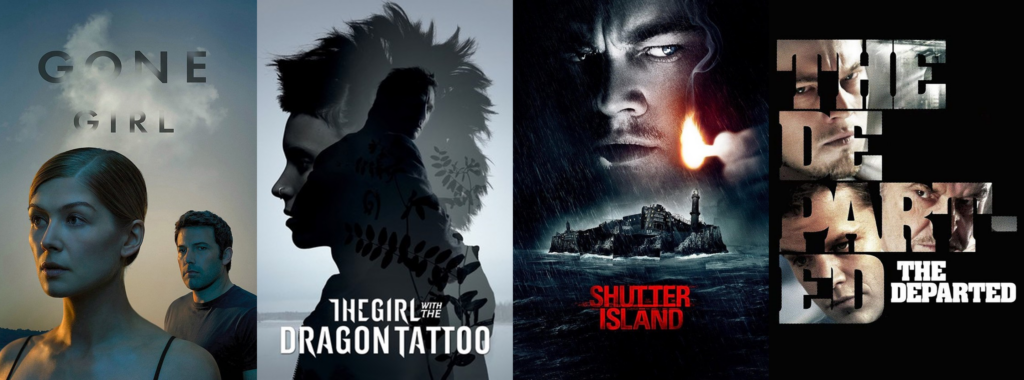
Shutter Island (2010) | Rating: 77%
Directed by: Martin Scorsese | Based on: Dennis Lehane’s psycho thriller novel
Starring Leonardo DiCaprio
The Departed (2006) | Rating: 86% | 4 Oscars Winner
Oscars for Best Picture and Directing by: Martin Scorsese | Oscar for Best Adapted Screenplay: William Monahan | Based on: Andrew Lau and Alan Mak’s thriller film
Starring Leonardo DiCaprio
Fight Club (1999) | Rating: 81%
Directed by: David Fincher | Based on: Chuck Palahniuk’s novel
Starring Brad Pitt
Se7en (1995) | Rating: 83%
Directed by: David Fincher | Screenplay: Andrew Kevin Walker
Starring Brad Pitt
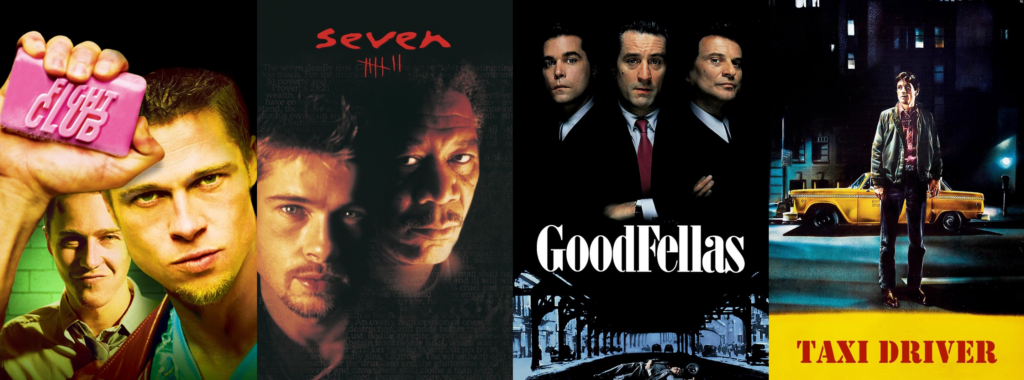
Goodfellas (1990) | Rating: 93% | 1 Oscar Winner
Directed by: Martin Scorsese | Based on: Nicholas Pileggi’s non-fiction book
Starring Robert de Niro
Taxi Driver (1976) | Rating: 88%
Directed by: Martin Scorsese | Screenplay: Paul Schrader
Starring Robert de Niro
Fantasy, Alternate Reality and Speculative movies or series
Pan’s Labyrinth (2006) | Rating: 86% | 3 Oscars Winner
Directed and written by: Guillermo del Toro
Shape of Water (2017) | Rating: 79% | 4 Oscars Winner
Oscars for Best Picture and Directing: Guillermo del Toro
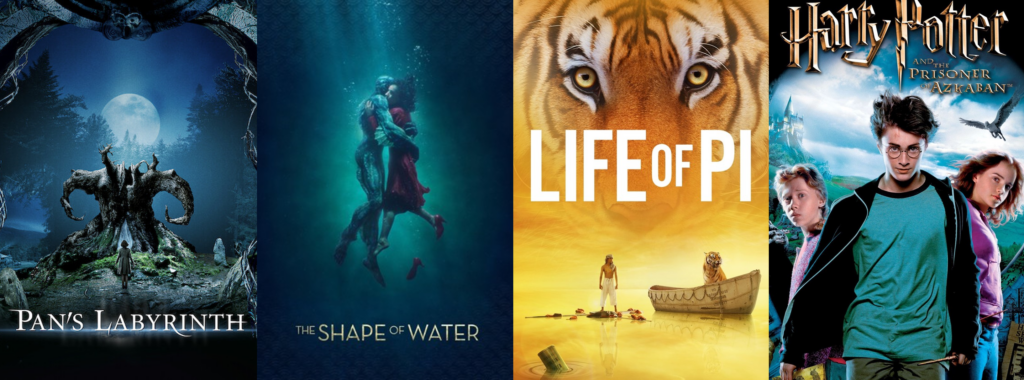
Life of Pi (2012) | Rating: 79% | 4 Oscars Winner
Oscar for Best Directing: Ang Lee | Based on: Yann Martel’s novel
Harry Potter and the Prisoner of Azkaban (2004) | Rating: 82%
Directed by: Alfonso Cuarón | Based on: J.K. Rowling’s series of fantasy novels
Game of Thrones (TV Series 2011-2019) | Rating: 89% | Network: HBO
Created by: David Benioff and D. B. Weiss | Based on: George R. R. Martin’s series of fantasy novels
Lord of the Rings: The Return of the King (2003) | Rating: 89% | 11 Oscars Winner
Oscars for Best Picture, Directing and Adapted Screenplay: Peter Jackson | Based on: J. R. R. Tolkien’s series of fantasy novel
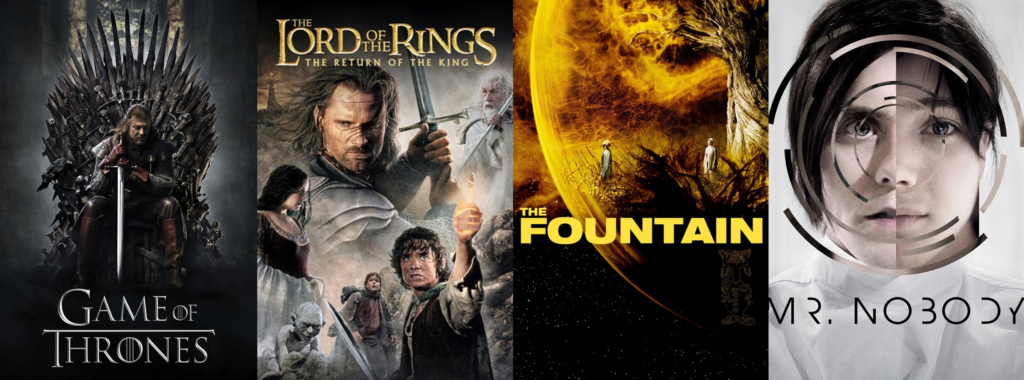
The Fountain (2006) | Rating: 63%
Directed and written by: Darren Aronofsky
Mr Nobody (2009) | Rating: 70%
Directed and written by: Jaco Van Dormael
2046 (2004) | Rating: 80%
Directed and written by: Wong Kar-wai
Midnight in Paris (2011) | Rating: 80%
Directed and written by: Woody Allen
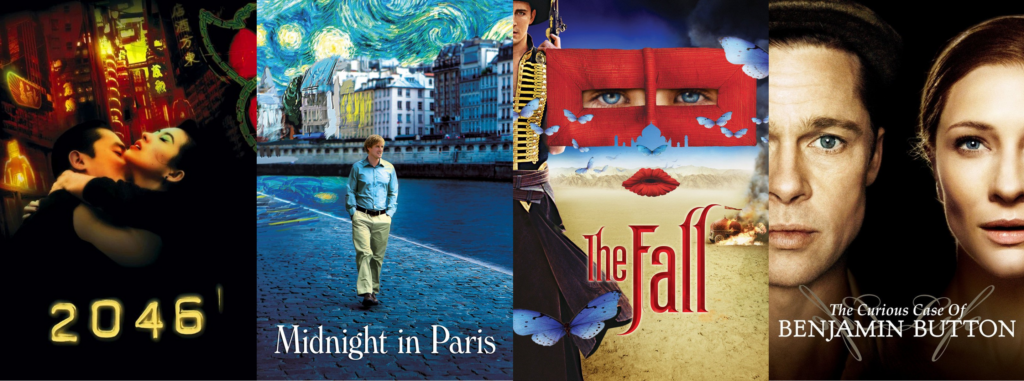
The Fall (2006) | Rating: 76%
Directed and co-written by: Tarsem Singh
Benjamin Button (2008) | Rating: 76%
Directed by: David Fincher | Screenplay: Eric Roth | Based on: F. Scott Fitzgerald’s short story
Top 20 Animated Fantasy and SciFi movies of all time
Best Innovative Visuals
Fantasia (1940) | Rating: 83% | Production: Disney
Story direction by: Joe Grant and Dick Huemer
Fantastic Planet (1973) | Rating: 81% |
Directed by: René Laloux | Story by: René Laloux and Roland Topor
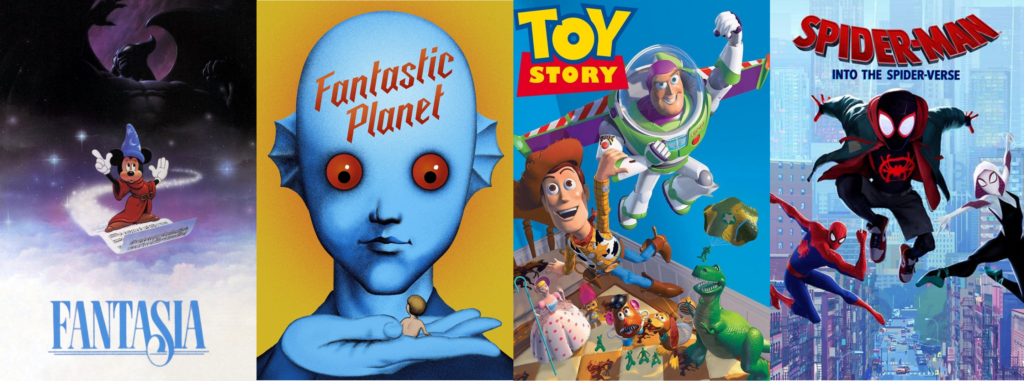
Toy Story (1995) | Rating: 88% | Production: Pixar
Directed by: John Lasseter | Story by: John Lasseter, Pete Docter, Andrew Stanton and Joe Ranft
Spider-Man Into the Spider-Verse (2018) | Rating: 89% | Oscar for Best Animated Film | Production: Sony
Directed by: Bob Persichetti, Peter Ramsey and Rodney Rothman | Story by: Phil Lord
Disney
Beauty and the Beast (1991) | Rating: 85% | Oscars for Best Music, Original Score and Original Song
Aladin (1992) | Rating: 85% | Oscars for Best Music, Original Score and Original Song
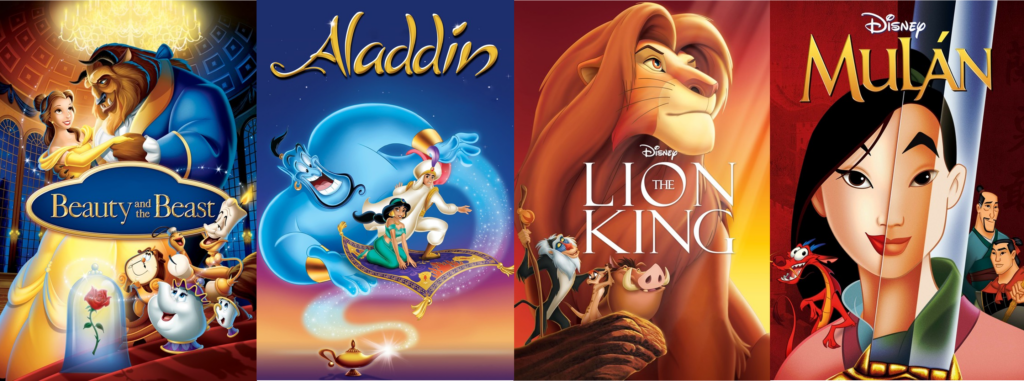
Lion King (1994) | Rating: 86% | Oscars for Best Music, Original Score and Original Song
Mulan (1998) | Rating: 81%
Pixar
Ratatouille (2007) | Rating: 88% | Oscar for Best Animated Film
Wall-E (2008) | Rating: 89% | Oscar for Best Animated Film
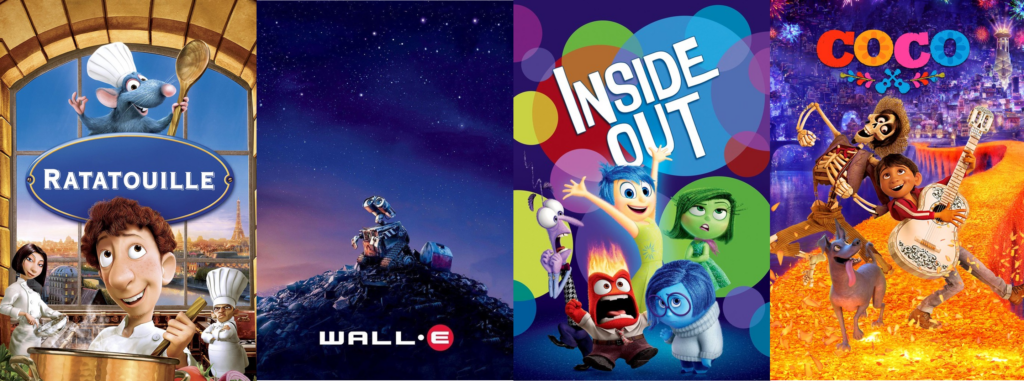
Inside Out (2015) | Rating: 87% | Oscar for Best Animated Film
Coco (2017) | Rating: 87% | Oscar for Best Animated Film and Best Music, Original Song
Japanese anime
Akira (1988) | Rating: 83%
Manga created by Katsuhiro Ôtomo, supervising director of the anime
Ghost in the Shell (1995) | Rating: 83%
Directed by: Mamoru Oshii | Based on: Masamune Shirow’s manga
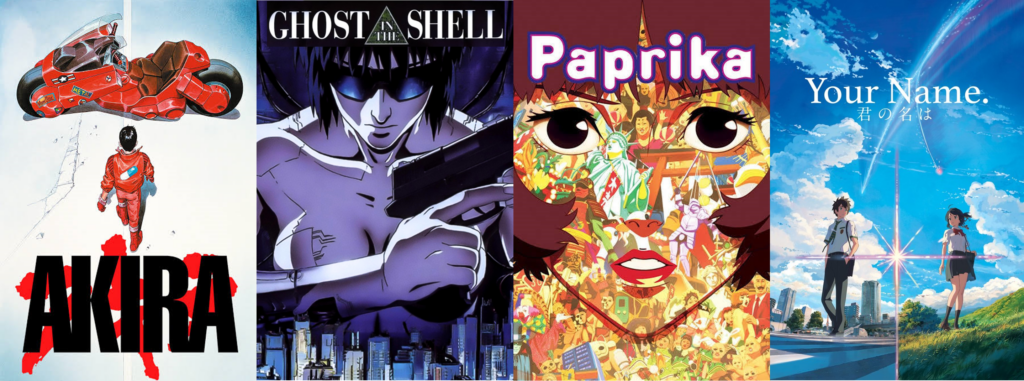
Paprika (2006) | Rating: 81%
Directed by: Satoshi Kon | Based on: Yasutaka Tsutsui’s Sci-Fi novel
Your Name (2016) | Rating: 87%
Directed and written by: Makoto Shinkai
Studio Ghibli
All those movies were written and directed by the legendary Hayao Miyazaki
Nausicaä of the Valley of the Wind (1984) | Rating: 86%
My Neighbor Totoro (1988) | Rating: 87%
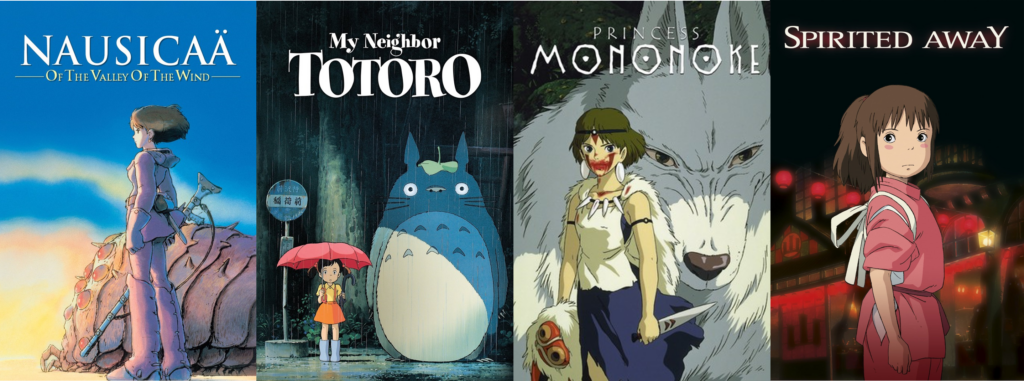
Princess Mononoke (1997) | Rating: 88%
Spirited Away (2001) | Rating: 92% | Oscar for Best Animated Film
Top SciFi and dystopian TV Series of 2010s & 2020s
Blockbuster & Space TV Series
The Mandalorian (TV Series 2019-) | Rating: 82% | Network: Disney+
Created by: Jon Favreau | Based on: George Lucas’s Star Wars saga
Strange New Worlds (TV Series 2022-) | Rating: 83% | Network: Paramount+
Created by: Akiva Goldsman, Alex Kurtzman & Jenny Lumet | Based on: Gene Roddenberry’s Star Trek saga
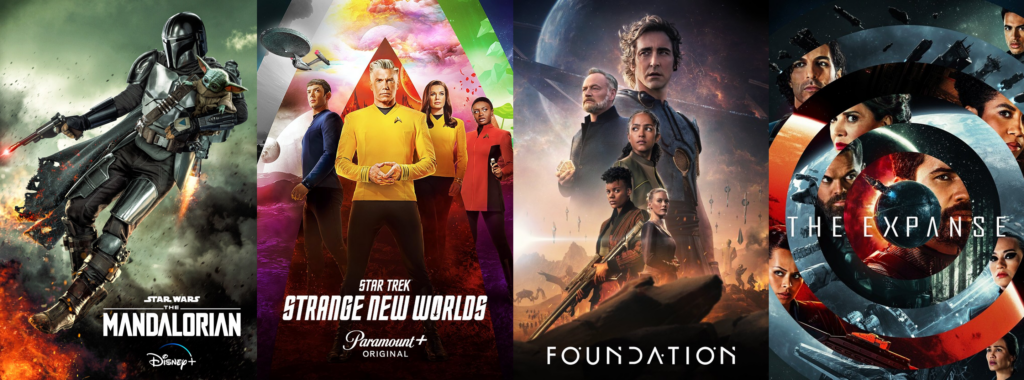
The Expanse (TV Series 2015-2022) | Rating: 89% | Network: Syfy (s1-3) / Amazon Prime Video (s4-6)
Created by: Daniel Abraham, Mark Fergus and Ty Franck | Based on: James S. A. Corey’s series of SciFi novels
Foundation (TV Series 2021-) | Rating: 75% | Network: Apple TV+
Created by: David S. Goyer and Josh Friedman | Based on: Isaac Asimov’s series of SciFi novels
Alternate history & reality TV Series
For All Mankind (TV Series 2019-) | Rating: 80%
Created by: Ronald D. Moore, Matt Wolpert and Ben Nedivi
The Man in the High Castle (2015-2019) | Rating: 82%
Created by: Frank Spotnitz | Based on: Philip K. Dick’s SciFi novel
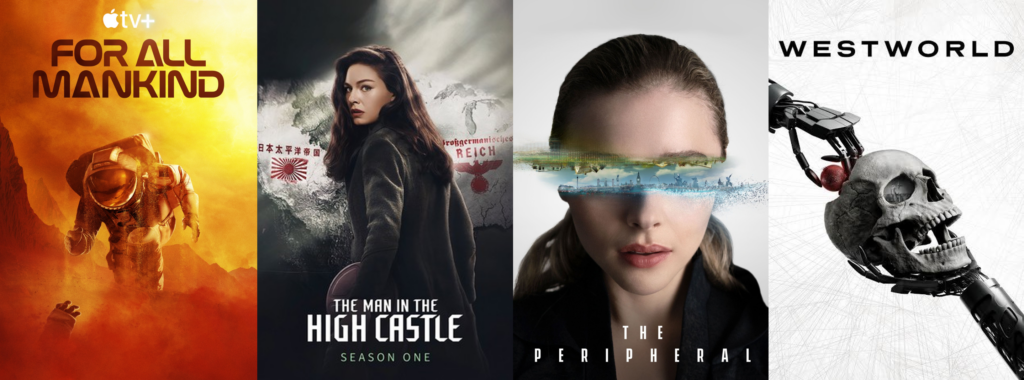
The Peripheral (2022-) | Rating: 77% | Network: Amazon Prime Video
Created by: Scott B. Smith | Based on: William Gibson’s Sci-Fi novel trilogy
Westworld (TV Series 2016–2022) | Rating: 81% | Network: HBO/Warner
Created by: Jonathan Nolan & Lisa Joy | Based on: Michael Crichton’s film
Psychological & Mystery TV Series
The Handmaid’s Tale (2017-) | Rating: 81% | Network: Hulu/Disney+
Created by: Bruce Miller | Based on: Margaret Atwood’s Sci-Fi novel
Severance (2022-) | Rating: 88% | Network: Apple TV+
Created and written by: Dan Erickson
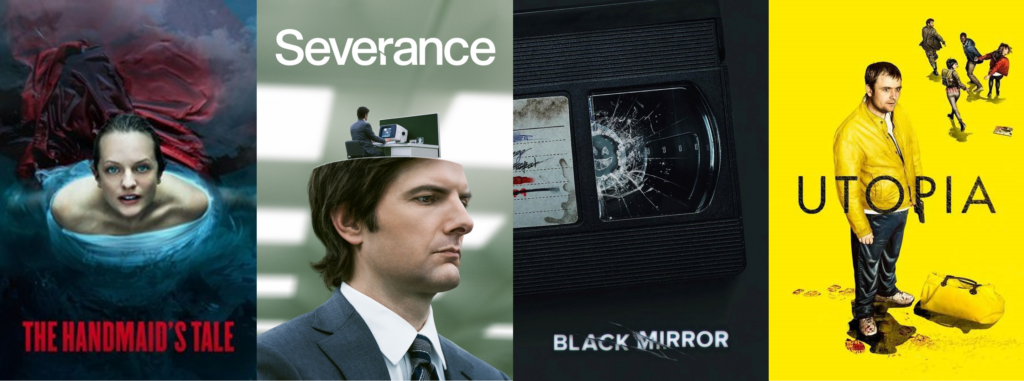
Black Mirror (2011-) | Rating: 86% | Network: Channel 4 (s1-2) / Netflix (s2-6)
Created and written by: Charlie Brooker
Utopia (TV Series 2013–2014) | Rating: 90% | Network: Channel 4
Created and written by: Dennis Kelly
The Space Exploration for All Humankind
Sunshine (2007) | Rating: 72%
Directed by: Danny Boyle | Screenplay: Alex Garland
Ad Astra (2019) | Rating: 70%
Directed and co-written by: James Gray
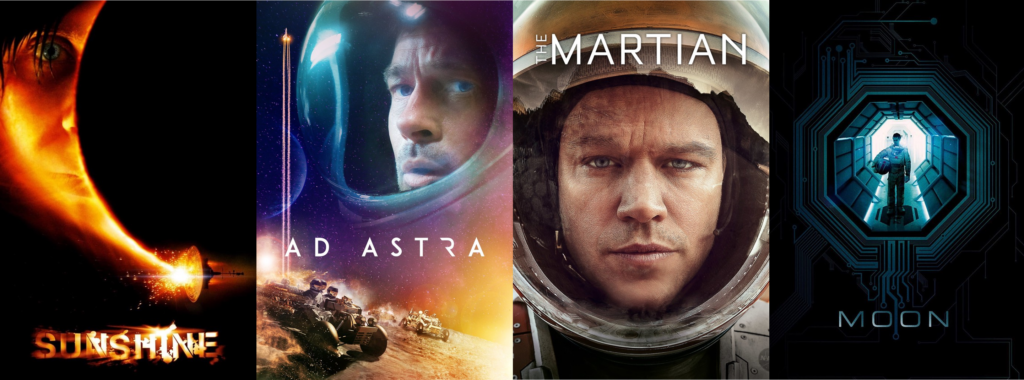
The Martian (2015) | Rating: 80%
Directed by: Ridley Scott | Based on: Andy Weir’s SciFi novel
Moon (2009) | Rating: 79%
Directed by: Duncan Jones | Screenplay: Nathan Parker
Gravity (2013) | Rating: 83% | Oscars for Best Cinematography, VFX, Sound and Music
Oscar for Best Directing, Film Editing: Alfonso Cuarón | Screenplay: Alfonso Cuarón & Jonás Cuarón
Apollo 13 (1995) | Rating: 78% | 2 Oscars Winner
Directed by: Ron Howard | Based on: astronaut Jim Lovell’s non-fiction book
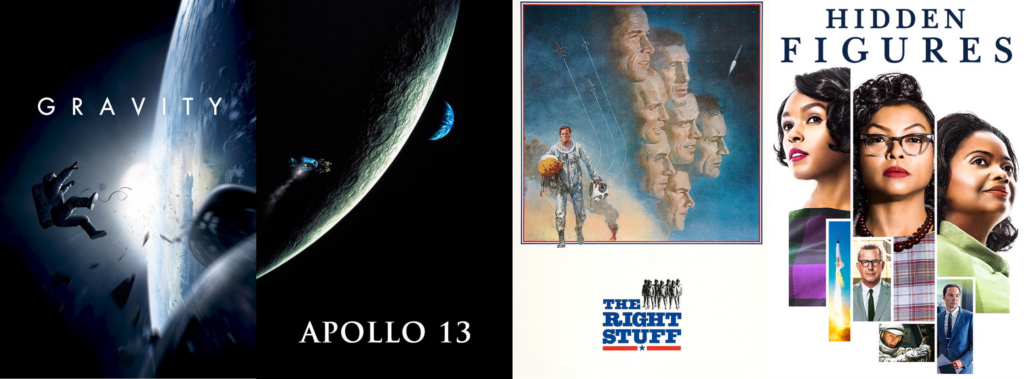
The Right Stuff (1983) | Rating: 87% | 4 Oscars Winner
Directed by: Philip Kaufman | Based on: Tom Wolfe’s non-fiction book
Hidden Figures (2016) | Rating: 81%
Directed by: Theodore Melfi | Based on: Margot Lee Shetterly’s non-fiction book
First Man (2018) | Rating: 77% | Oscar for Best VFX
Directed by: Damien Chazelle | Based on: Neil Armstrong’s biography written by James R. Hansen
For All Mankind (TV Series 2019-) | Rating: 80%
Created by: Ronald D. Moore, Matt Wolpert and Ben Nedivi
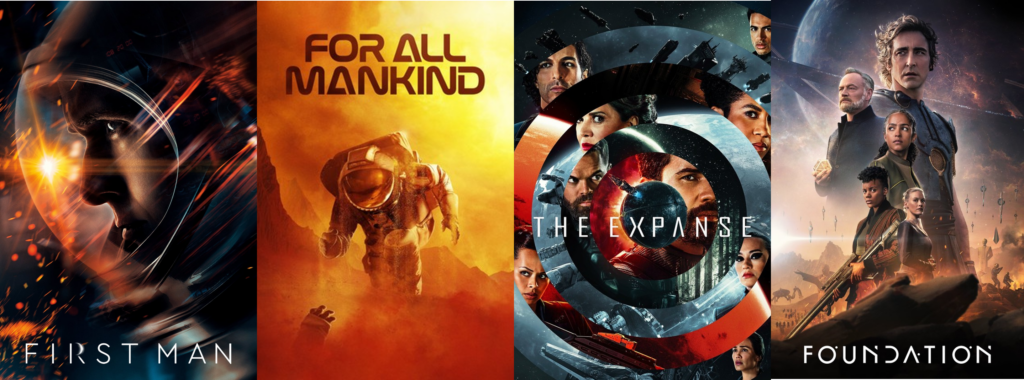
The Expanse (TV Series 2015-2022) | Rating: 89%
Created by: Daniel Abraham, Mark Fergus and Ty Franck | Based on: James S. A. Corey’s series of SciFi novels
Foundation (TV Series 2021-) | Rating: 75%
Created by: David S. Goyer and Josh Friedman | Based on: Isaac Asimov’s series of SciFi novels
Parallel Realms: the Imaginative Visions of the Wachowskis, Zemeckis and Niccol
V For Vendetta (2006) | Rating: 76%
Directed by: James McTeigue | Screenplay: The Wachowskis | Based on: David Lloyd’s Graphic Novel
The Matrix (1999) | Rating: 82% | Oscars for Best VFX, editing, Sound & Sound Effects
Directed and written by The Wachowskis
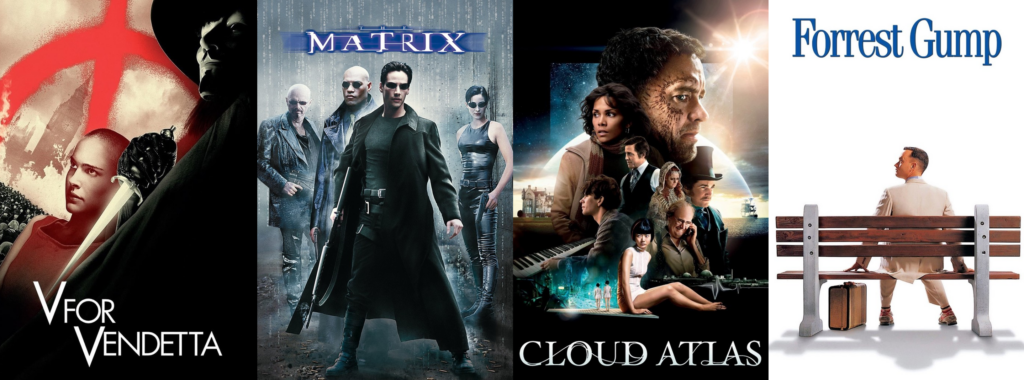
Cloud Atlas (2012) | Rating: 68%
Directed and written by: The Wachowskis & Tom Tykwer | Based on: David Mitchell’s novel
Forrest Gump (1994) | Rating: 81% | Oscars for Best Picture, Actor, Film Editing and VFX
Oscar for Best Director: Robert Zemeckis | Oscar for Best Adapted Screenplay: Eric Roth | Based on: Richard McGuire’s graphic novel
Back to the Future (1985) | Rating: 86% | Oscar for Best Sound Effects
Directed by: Robert Zemeckis | Screenplay: Robert Zemeckis | Based on Winston Groom’s novel
The Truman Show (1998) | Rating: 85%
Directed by: Peter Weir | Screenplay: Andrew Niccol
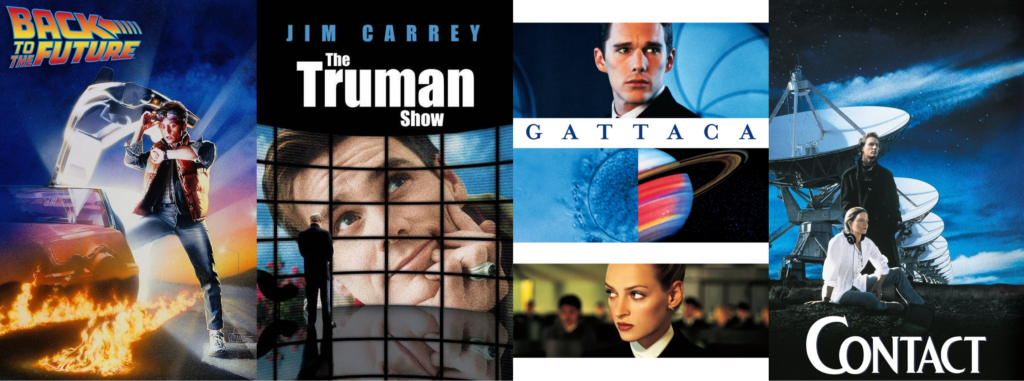
Gattaca (1997) | Rating: 79%
Directed and written by: Andrew Niccol
Contact (1997) | Rating: 73%
Directed by: Robert Zemeckis | Based on: Carl Sagan’s SciFi novel
Dystopian, Apocalyptic & other Sci-Fi movies or TV Series
Silo (2023-) | Rating: 78%
Created by: Graham Yost | Based on: Hugh Howey’s Sci-Fi novel trilogy
District 9 (2009) | Rating: 80%
Directed and written by: Neill Blomkamp
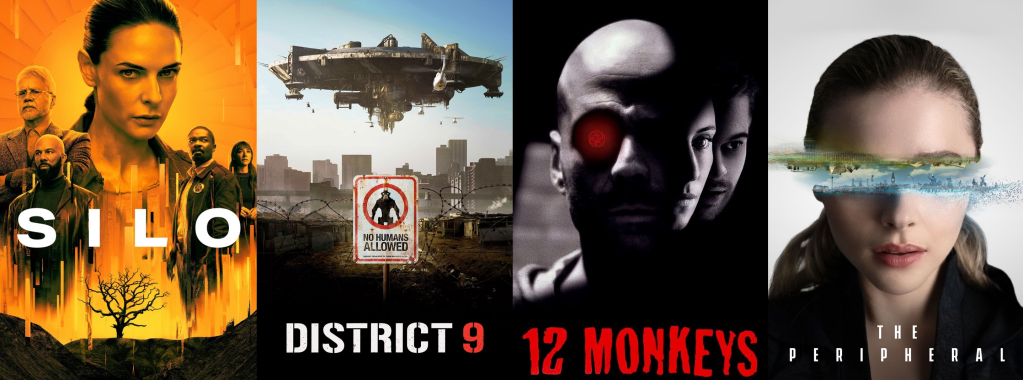
Twelve Monkeys (1995) | Rating: 82%
Directed by: Terry Gilliam | Inspired by Chris Marker’s 1962 short film La Jetée
The Peripheral (2022-) | Rating: 77%
Created by: Scott B. Smith | Based on: William Gibson’s Sci-Fi novel trilogy
The Handmaid’s Tale (2017-) | Rating: 81%
Created by: Bruce Miller | Based on: Margaret Atwood’s Sci-Fi novel
Children of Men (2006) | Rating: 84%
Directed by: Alfonso Cuarón | Based on: Phyllis Dorothy James’s Sci-Fi novel

Never Let Me Go (2010) | Rating: 70%
Directed by: Mark Romanek | Based on: Kazuo Ishiguro’s novel
Black Mirror (2011-) | Rating: 86%
Created and written by: Charlie Brooker
Severance (2022-) | Rating: 88%
Created and written by: Dan Erickson
Source Code (2011) | Rating: 76%
Directed by: Duncan Jones | Screenplay: Ben Ripley
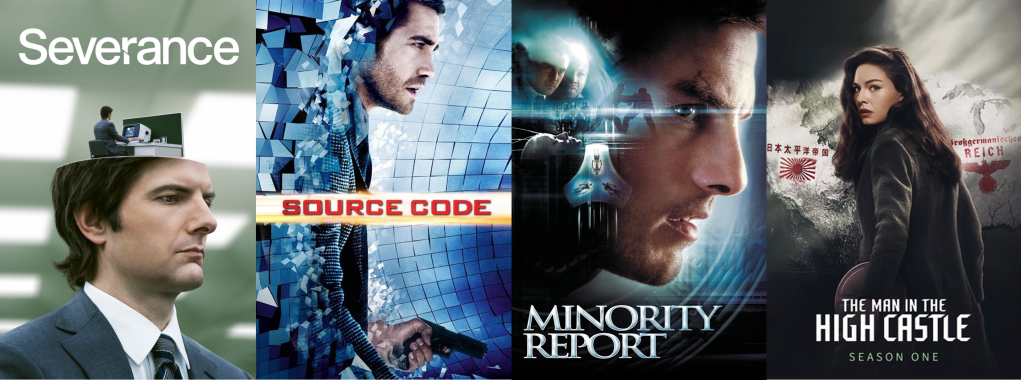
Minority Report (2002) | Rating: 81%
Directed by: Steven Spielberg | Based on: Philip K. Dick’s SciFi novel
The Man in the High Castle (2015-2019) | Rating: 82%
Created by: Frank Spotnitz | Based on: Philip K. Dick’s SciFi novel
Bong Joon-ho and the Recognition of the Korean New Wave
Burning (2018) | Rating: 83%
Directed by: Lee Chang-dong | Based on: Haruki Murakami’s short story
Parasite (2019) | Rating: 92% | Oscar for Best International Feature Film
Oscars for Best Picture, Directing and Original Screenplay: Bong Joon-ho

Decision To Leave (2022) | Rating: 82%
Directed by: Park Chan-wook | Screenplay: Chung Seo-kyeong & Park Chan-wook
Old Boy (2003) | Rating: 85%
Directed by: Park Chan-wook | Inspired by the Japanese manga series written by Garon Tsuchiya and illustrated by Nobuaki Minegishi
Memories of Murder (2003) | Rating: 88%
Directed by: Bong Joon-ho | Based on: Kim Kwang-rim’s play
Mother (2009) | Rating: 85%
Directed by: Bong Joon-ho | Screenplay: Bong Joon-ho & Park Eun-kyo

Snowpiercer (2013) | Rating: 78%
Directed by: Bong Joon-ho | Based on the French climate fiction graphic novel Le Transperceneige
Okja (2017) | Rating: 78%
Directed by: Bong Joon-ho | Screenplay: Bong Joon-ho & Jon Ronson
The Digital Media Revolution & Imagination of Cyberworlds
Akira (1988) | Rating: 83%
Manga created by Katsuhiro Ôtomo, supervising director of the anime
Ghost in the Shell (1995) | Rating: 83%
Directed by: Mamoru Oshii | Based on: Masamune Shirow’s manga

Spirited Away (2001) | Rating: 92% | Oscar for Best Animated Film
Written and directed by: Hayao Miyazaki
Paprika (2006) | Rating: 81%
Directed by: Satoshi Kon | Based on: Yasutaka Tsutsui’s Sci-Fi novel
Everything Everywhere All at Once (2022) | Rating: 83% | 7 Oscars Winner
Oscars for Best Picture, Directing and Original Screenplay: Daniel Kwan & Daniel Scheinert
Eternal Sunshine of the Spotless Mind (2004)| Rating: 86%
Directed by: Michel Gondry | Oscar for Best Original Screenplay: Charlie Kaufman
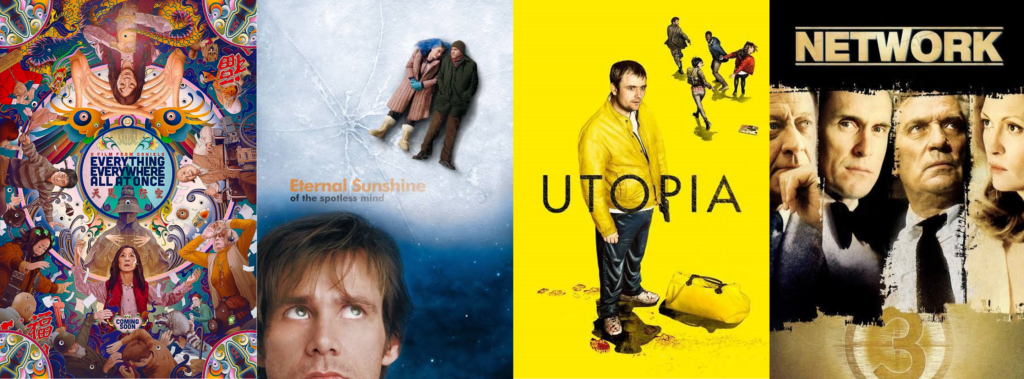
Utopia (TV Series 2013–2014) | Rating: 90%
Created and written by: Dennis Kelly
Network (1976) | Rating: 84% | 4 Oscars Winner
Directed by: Sidney Lumet | Oscar for Best Original Screenplay: Paddy Chayefsky
The Social Network (2010) | Rating: 86% | 3 Oscars Winner
Directed by: David Fincher | Oscar for Adapted Screenplay: Aaron Sorki | Based on: Ben Mezrich’s non-fiction book
Steve Jobs (2015) | Rating: 75%
Directed by: Danny Boyle | Based on: Walter Isaacson’s non-fiction book adapted by Aaron Sorkin

Ex Machina (2014) | Rating: 80% | Oscar for Best VFX
Written and Directed by: Alex Garland
Westworld (TV Series 2016–2022) | Rating: 81%
Created by: Jonathan Nolan & Lisa Joy | Based on: Michael Crichton’s film
